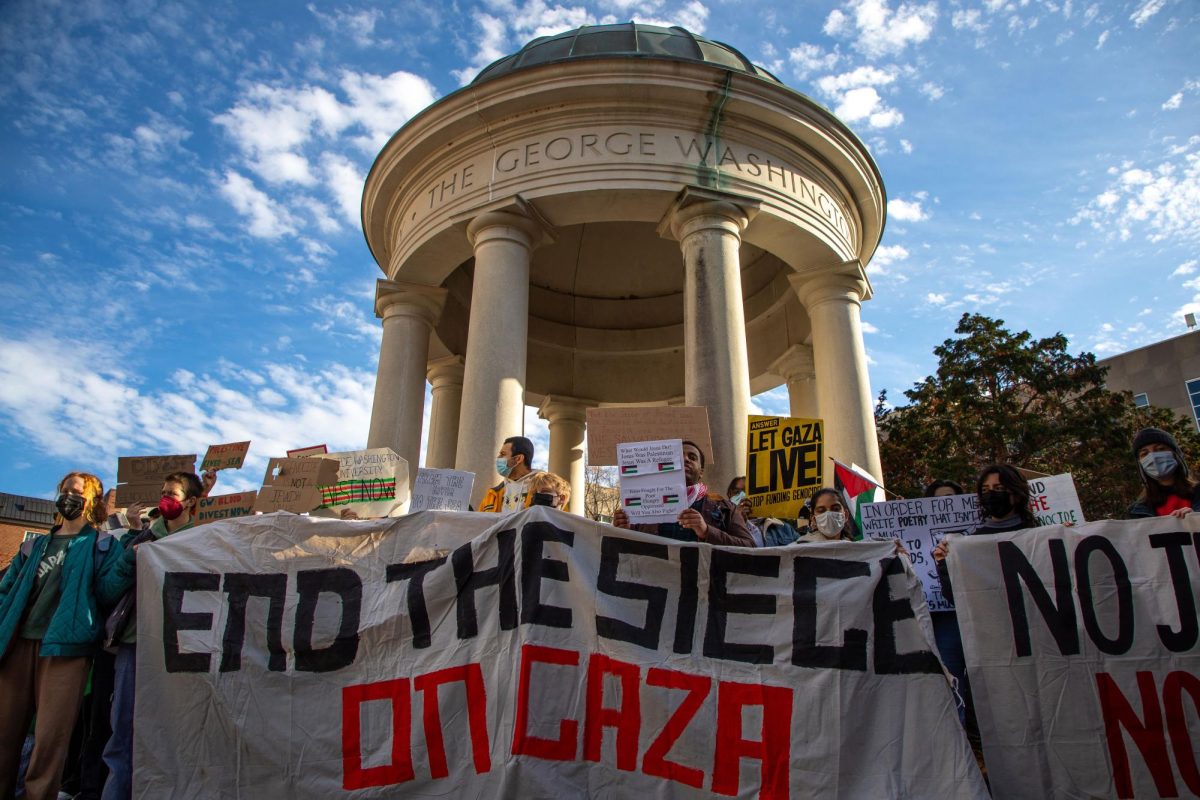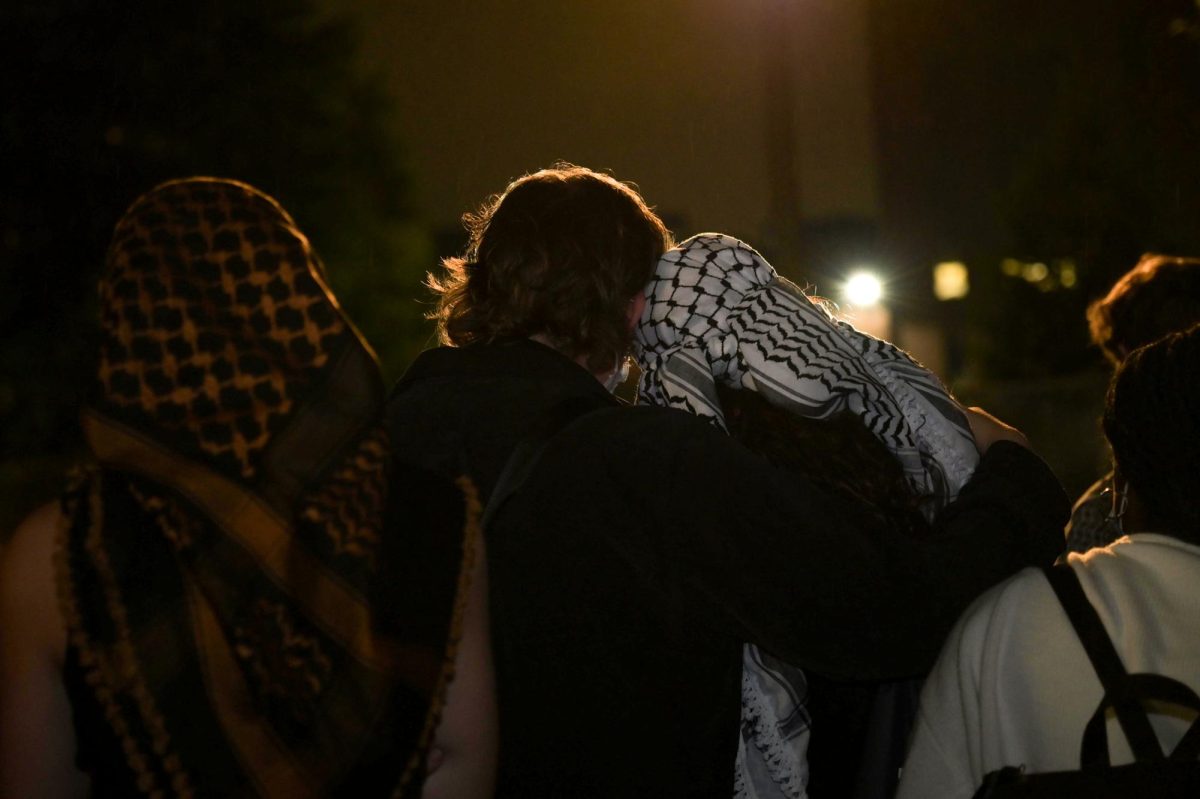Pro-Palestinian student advocates said they’ve rallied together to uplift Palestinian voices and experiences on campus despite resistance from the University, one year after the onset of the war in Gaza.
After Hamas’ attack on Israel on Oct. 7, 2023, shortly followed by Israel’s bombing of the Gaza Strip, GW became a focal point for pro-Palestinian student activism, with vigils, sit-ins, marches and a nearly two-week encampment in University Yard in solidarity with Gaza, amassing fervent student support amid alleged sanctions and suspensions from officials. Pro-Palestinian student activists said Oct. 7 represents a somber marker of Palestinians killed by the Israeli military within the past year and stands as a moment that brought visibility to the Palestinian cause on campus and internationally.
Manny Blanco, an organizer with the GWU Student Coalition for Palestine, said visibility of Palestinian suffering has reached a “critical mass,” sparking an internationally recognized understanding of the war in Gaza since it first broke out.
As the war hits its one-year mark, more than 41,000 Palestinians — the majority women and children — have been killed by the Israeli military in Gaza since Oct. 7, when Hamas killed more than 1,200 Israelis and took more than 250 hostages. The humanitarian crises in Gaza continues to worsen as famine spreads throughout the region, according to United Nations experts.
Blanco said officials used to “take advantage” of the fact that the Israel-Palestine conflict was “in the margins” and less recognized before the war by taking disciplinary action against pro-Palestinian speech on campus. He said the start of the war in Gaza last year on Oct. 7 solidified his decision to participate however he could in the pro-Palestinian movement on campus because of the University’s “harsh” response to Palestinian voices after Oct. 7.
“The school’s response is now something that a lot of eyes are on and is on a public platform, and so everyone’s attention is there,” Blanco said.
He said the vigil that Students for Justice in Palestine organized days after Oct. 7, which University President Ellen Granberg condemned as a “celebration of terrorism,” helped convey to students the tragedy of strikes on Palestinians. He said vigils are not “explicitly” protests but are spaces for communities to mourn publicly together, which he said only nonminority communities have the “luxury” to do.
Candles lit the center of Kogan Plaza last year as roughly 120 students joined together during the vigil to mourn Palestinians killed during Israel’s bombing of Gaza, reading the names of people killed in the strikes, playing music and delivering speeches. An SJP organizer said at the event that the Oct. 7 attacks marked a new era in Palestine’s struggle for liberation, with “resistance fighters” dispelling the “illusion of invincibility.”
“This specific form of putting the issue in front of everyone, a mainstream way, has a lot of power in heightening the contradictions in terms of how we view race in the United States and the way that we construe narratives of certain people in certain countries and things like that,” Blanco said.
Reports of Islamophobia increased from 16 in September 2023 to 64 in October 2023, a 300 percent increase, according to the FBI Crime Data Explorer.
Weeks after Oct. 7, four members of SJP projected anti-Israel and anti-GW messages, like “End the siege on Gaza” and “GW the blood of Palestine is on your hands” onto Gelman Library. Granberg said the projections were antisemitic and violated University policy in her statement following the demonstration. The University later suspended the group, preventing them from hosting and participating in on-campus activities for at least 90 days, the first wave of sanctions on the group after the war.
“There’s not a lot of Palestinian voices and when there are, they’re silenced,” Blanco said.

Blanco said the level of solidarity among Palestinian students and pro-Palestinian activists on campus is “huge.” He said campus protests seek to uplift Palestinian voices and support them by joining them in demonstrations and pro-Palestinian activism wherever students can.
Blanco said as the student coalition continues to call on officials to divest from companies that provide weapons to Israel, he understands it would be “very hard” for the University to divest in terms of its willingness to financially pull out from companies and harness support from stakeholders. But he said officials’ lack of consideration for their demands is “appalling,” referencing GW’s refusal to divest from companies partnering with Israel.
“There’s zero acknowledgement of the severity at all or of the validity of the demand,” Blanco said.
A member of GW’s chapter of Jewish Voice for Peace, a Jewish anti-Zionist organization, who requested anonymity due to fear of doxxing and retaliation, said after one year of protest following Oct. 7, pro-Palestinian demonstrations will grow larger and “more fierce.” The member said within the past year, pro-Palestinian protesters have witnessed a period of surveillance and “repression” from universities across the country, but student movements have never been more “formidable” within the 76 years since Palestinians were displaced from what is now Israel as students join protests across the country.
“We draw our strength from our brothers and sisters in Palestine and continue to seek guidance in our Jewish ancestors who knew millennia of Judaic tradition free of Zionism,” the member said in an email.
The JVP member said GW has a history of “targeting, maligning and penalizing” pro-Palestinian student activism on campus and that officials have continued this by allowing local police to clear the encampment in U-Yard in the spring and placing sanctions on pro-Palestinian student organizations.
“As thousands of bombs rain on the heads of our brave brothers and sisters in Gaza and Lebanon, students have not lost faith in their power,” the member said.
During the encampment, officials allegedly suspended at least seven students on the third day of protest for their involvement in the demonstration. On the ninth day, officials hung a large American flag off the roof of Lisner Hall, which protesters responded to by projecting an image of President Joe Biden above the words “Genocide Joe.” Coining U-Yard “Shohada’ Square” and draping pro-Palestinian garb around the George Washington statue’s shoulders, protesters turned the plaza into a hotbed for pro-Palestinian dissent.
The JVP member said the encampment in U-Yard strengthened the power of the student movement and “fractured” administration. They added that organizers hosted Shabbat dinners during the encampment for protesters and community members.
The coalition claimed in August that officials suspended two pro-Palestinian organizations and put an additional six groups on disciplinary probation for their alleged involvement in the encampment. Officials suspended JVP through the fall semester, alongside SJP, the coalition said.
The JVP member said the group has experienced a “surge” in membership and participation following the encampment and the suspension of JVP’s campus chapter with students who are navigating the distinction between their Jewish upbringings and pro-Israel ideologies.
“This is especially the case with many young Jewish students who reckon with the cognitive dissonance felt between a Jewish upbringing that was bastardized by a fascist political ideology, Zionism, that has absolutely nothing to do with our religion of community, justice, love and repentance,” the member said.
Deepashish Basu, a sophomore and a frequent participant in pro-Palestinian protests on campus, said Oct. 7 marks the deaths of more than 40,000 people and widespread unrest internationally. He said one year later, nothing has changed, both internationally and concerning GW’s “divided” campus culture.
“We just want to know what’s the best way forward for this University,” Basu said. “And overall, is there a way to heal the gaps and divides between groups without getting more divided even further?”
Last November, about 30 students engaged in a three-hour sit-in in front of the Elliott School for International Affairs, which was later disrupted by a billboard truck sponsored by conservative media watchdog group Accuracy in Media that doxxed GW students by displaying the names and faces of students allegedly involved with the pro-Palestinian student coalition. Granberg and Vice Provost for Student Affairs and Dean of Students Colette Coleman said in a statement that the truck was a “malicious” attempt to endanger members of the GW community.
Basu said he’s been doxxed in the past but not to the extent that all of his personal information was exposed publicly. He said student protesters depend on each other for support in light of the potential threats of protesting for the Palestinian cause, like doxxing and arrest.
Since Oct. 7, dozens of pro-Palestinian students have spoken to The Hatchet on conditions of anonymity due to heightened fears of doxxing or retaliation within the past year. In May, Reuters reported that since the start of the conflict in Gaza, 250 students had been added to The Canary Mission, a site that accuses pro-Palestinian students of supporting terrorism and antisemitism.
“I don’t show fear because I want to stand down and show them I am in solidarity and support,” Basu said.
Jennifer Igbonoba contributed reporting.





